
Microbial Physiology
metrics 2024
Unveiling the Secrets of Microbial Functionality
Introduction
Microbial Physiology is a premier, peer-reviewed journal published by KARGER, dedicated to advancing the field of microbiology through innovative research and reviews. With an ISSN of 2673-1665 and an E-ISSN of 2673-1673, the journal stands out in the academic landscape having established a strong track record since its inception in 2020, converging its scope until 2024. It proudly holds a Q2 category ranking in several key areas including Applied Microbiology and Biotechnology, Biochemistry, and Microbiology, making it an essential resource for researchers and professionals in these disciplines. The journal provides open access options to ensure that cutting-edge findings are widely disseminated, fostering collaboration and knowledge sharing. As a vital contributor to the ongoing discourse in microbial physiology, the journal serves as a platform for novel discoveries and methodologies that can significantly impact health, industry, and environmental sustainability. Located in Basel, Switzerland, it brings together a global community of scholars eager to further explore the complexities of microbial life.
Metrics 2024
 0.70
0.70 2.90
2.90 3.00
3.00 86
86Metrics History
Rank 2024
Scopus
IF (Web Of Science)
JCI (Web Of Science)
Quartile History
Similar Journals

PLASMID
Fostering innovation in gene expression studies.PLASMID is a prestigious academic journal published by Academic Press Inc Elsevier Science that focuses on the dynamic field of molecular biology, particularly in the study of plasmids and their roles in gene function and expression. Since its inception in 1977, the journal has built a robust reputation, currently holding a Q3 category ranking in Molecular Biology and positioning itself within the 34th percentile based on Scopus metrics, making it a valuable resource for researchers and professionals alike. With an ISSN of 0147-619X and E-ISSN 1095-9890, PLASMID offers a wealth of articles that delve into cutting-edge research, facilitating knowledge-sharing and inspiring innovations in the field. Although it does not operate under an open-access model, the journal remains committed to advancing scholarly communication and maintaining high standards of academic rigor. Researchers and students engaged in biochemistry, genetics, and molecular biology will find PLASMID to be an essential platform for disseminating their findings and exploring novel ideas.
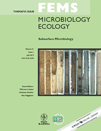
FEMS MICROBIOLOGY ECOLOGY
Connecting Research and Application in Microbial EcologyFEMS Microbiology Ecology is a prestigious journal published by Oxford University Press, specializing in the dynamic field of microbiology and its ecological implications. With an impressive impact factor and consistently ranked in the top quartiles (Q1) across multiple categories—including Applied Microbiology and Biotechnology, Ecology, and Microbiology—this journal serves as an essential resource for researchers and professionals aiming to advance their understanding of microbial interactions within ecosystems. Established in 1990 and spanning to 2024, FEMS Microbiology Ecology delivers cutting-edge research, reviews, and insightful discussions that illuminate the complex roles microorganisms play in environmental health and sustainability. Located in the United Kingdom, this journal provides a global platform for discourse, making significant contributions to both theoretical frameworks and practical applications in the biotech and environmental science sectors. Researchers and students alike will find a wealth of information that not only enriches their knowledge but also inspires innovative solutions for ecological challenges.

LETTERS IN APPLIED MICROBIOLOGY
Exploring Practical Applications of Microbial ResearchLETTERS IN APPLIED MICROBIOLOGY, published by OXFORD UNIVERSITY PRESS, is a prominent journal in the field of applied microbiology, serving as an essential platform for researchers and professionals to disseminate innovative findings. With an ISSN of 0266-8254 and an E-ISSN of 1472-765X, this peer-reviewed journal has been contributing to the scientific community since 1985 and continues to engage with cutting-edge research through 2024. With its current Scopus ranking placing it in the 45th percentile of its category, specifically at rank #70 out of 127 in the Applied Microbiology and Biotechnology field, it underscores its significance in advancing knowledge and applications pertinent to microbial science. Although it is not open access, LETTERS IN APPLIED MICROBIOLOGY offers comprehensive insights aimed at enhancing the understanding of microbiological phenomena in practical scenarios, making it a valuable resource for both seasoned experts and emerging scholars.
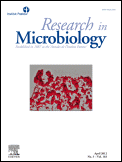
RESEARCH IN MICROBIOLOGY
Pioneering insights into the microbial universe.Research in Microbiology, published by Elsevier, is a prominent academic journal devoted to advancing the field of microbiology, encompassing a diverse array of topics including immunology, molecular biology, and biochemistry. Established in 1987, the journal has expanded its focus over the years, with a commendable impact factor reflecting its relevance and influence in the scientific community. Although it does not currently offer open access options, Research in Microbiology remains a crucial resource for researchers and professionals seeking to stay abreast of the latest findings and methodologies. The journal holds a respectable Q2 ranking in Medicine (miscellaneous) and a Q3 ranking in both Microbiology and Molecular Biology for 2023, highlighting its position within the scholarly landscape. With its base in France and accessible to a global audience, Research in Microbiology continues to foster scholarly exchange, making it an essential platform for the dissemination of impactful microbiological research.
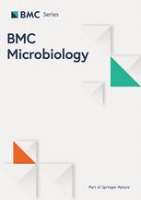
BMC MICROBIOLOGY
Advancing microbiological research for a healthier world.BMC Microbiology is a leading open access journal published by BMC, dedicated to advancing the field of microbiology since its inception in 2001. With an ISSN of 1471-2180, this journal provides a vital platform for researchers, professionals, and students to share and access high-quality research and innovation in both general and medical microbiology. Based in the United Kingdom, BMC Microbiology holds a commendable Q2 ranking in both various microbiological categories according to the 2023 Scopus rankings, indicating its strong influence in the microbiological community, with a rank of #47 out of 140 in Medical Microbiology and #62 out of 182 in general Microbiology. The journal's commitment to open access ensures that groundbreaking research is freely available to facilitate collaboration and knowledge sharing among the global community of microbiologists. With a focus on publishing original research, reviews, and case studies, BMC Microbiology plays a critical role in disseminating information that can impact health and environmental conditions around the world.
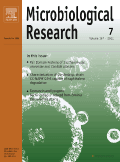
MICROBIOLOGICAL RESEARCH
Leading the Charge in Microbial AdvancementsMICROBIOLOGICAL RESEARCH, published by Elsevier GmbH, serves as a leading platform for advancements in the field of Microbiology, holding an impressive Q1 ranking in its category as of 2023. With an ISSN of 0944-5013 and E-ISSN 1618-0623, this journal has been instrumental in disseminating high-quality research since its inception in 1994 and continues to contribute significantly to the academic landscape through 2024. Positioned within the top 13% of publications in the Immunology and Microbiology category, ranked #24 out of 182 according to Scopus, it attracts the attention of researchers, professionals, and students alike. While the journal is not open access, it offers vital insights and peer-reviewed articles that drive innovation and exploration within microbiological research. Its rigorous selection process underscores the importance of quality and relevance in advancing knowledge in this dynamic field.

APPLIED BIOCHEMISTRY AND MICROBIOLOGY
Fostering Knowledge in the Dynamic Fields of Biochemistry and Microbiology.Applied Biochemistry and Microbiology is an esteemed journal published by Pleiades Publishing Inc, focusing on the intricate intersections of biochemistry and microbiology. Established in 1970, with a commitment to advancing scientific knowledge, this journal serves as a vital platform for disseminating innovative research findings in applied microbiology, biotechnology, and biochemistry. With its ISSN 0003-6838 and E-ISSN 1608-3024, the journal operates from its base in New York, USA. As a recognized publication in the field, Applied Biochemistry and Microbiology holds a Category Quartile ranking of Q3 in Applied Microbiology and Biotechnology and Q4 in Biochemistry, reflecting its significant contributions and relevance. Although currently not open access, the journal is indexed in Scopus, with respectable rankings that highlight its impact in the community, making it a pivotal resource for researchers and professionals dedicated to the realms of biochemistry and microbiology.

Microorganisms
Fostering collaboration in the realm of microbiology.Microorganisms is a leading open-access journal published by MDPI based in Switzerland, catering specifically to the rapidly evolving fields of microbiology and virology. Since its inception in 2013, the journal aims to foster the dissemination of high-quality research through its comprehensive and interdisciplinary platform, with a particular focus on both fundamental and applied microbiological sciences. Contributing to its esteemed reputation, Microorganisms holds a commendable Q2 ranking in the categories of Microbiology and Virology, as well as in Medical Microbiology, highlighting its significance in the academic community. With a consistent impact, evidenced by its rankings in Scopus—such as rank #25 in Virology and #56 in Microbiology—the journal serves as an invaluable resource for researchers, professionals, and students looking to stay at the forefront of microbiological research. As an open-access journal, Microorganisms ensures that vital research findings are readily available to a global audience, promoting collaboration and innovation in the study of microbial life and its implications for health and disease.
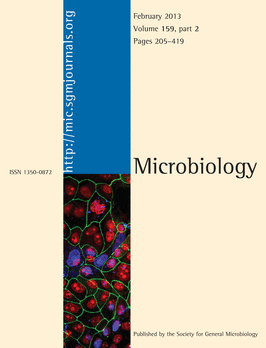
MICROBIOLOGY-SGM
Elevating research standards in microbiology, one article at a time.MICROBIOLOGY-SGM, published by the esteemed MICROBIOLOGY SOC in the United Kingdom, is a pioneering journal dedicated to advancing the field of microbiology. With its ISSN 1350-0872 and E-ISSN 1465-2080, the journal serves as a vital platform for researchers, professionals, and students to disseminate significant findings and engage in the latest developments in microbiology. Since its inception in 1994, MICROBIOLOGY-SGM has upheld rigorous academic standards, demonstrated by its position in the Q2 quartile of the 2023 Scopus category for Microbiology, ranking #108 out of 182. While traditionally not an open-access journal, it offers a rich selection of articles that address a variety of topics within the microbiological sciences. As we approach 2024, the journal continues to foster collaboration and knowledge exchange, making it an indispensable resource for those at the forefront of microbiological research.

Frontiers in Microbiology
Advancing the Frontiers of Microbial ScienceFrontiers in Microbiology is a leading open-access journal published by Frontiers Media SA, available since 2010, and based in Switzerland. As a prominent platform for innovative research, it specializes in microbiology and medical microbiology, marked by its impressive Q1 classification in the respective fields, reflecting its significant impact and relevance in advancing microbial sciences. With a Scopus ranking of 49th in Microbiology and 41st in Medical Microbiology, this journal is positioned among the top-tier publications, catering to a diverse audience of researchers, professionals, and students. The journal aims to disseminate groundbreaking findings and foster discussions that drive the field forward, ensuring a comprehensive coverage of microbiological studies, from basic research to applications in healthcare and beyond. Enjoy unrestricted access to cutting-edge articles that contribute to both theoretical and applied aspects of microbiology, enriching the scientific community's knowledge base.